Hemorrhagic cystitis is an inflammatory process that affects the mucous membrane of the bladder, resulting in blood clots in the urine.
Causes of hemorrhagic cystitis
The causes of hemorrhagic cystitis can be infectious and non-infectious in nature. Speaking of infectious agents, we should first mention Escherichia coli, which is responsible for 80-85% of episodes of urinary tract infection and Staphylococcus saprophyticus cystitis (responsible for 5-10% of episodes). Less common: Klebsiella, Proteus, Pseudomonas and Enterobacter. And among viruses, adenovirus (strains 7, 11, 21, 35), cytomegalovirus and influenza.
play a primary role. It is important to emphasize that in healthy patients, urinary infections lead to microhematuria, blood in the urine is released in very small quantities, which are not identified with the naked eye.
Massive hemorrhagic cystitis with an infectious etiology, as a rule, is the prerogative of patients with severe immunodeficiency.
Risk factors
Among the risk factors for infectious hemorrhagic cystitis, in addition to immunosuppressive conditions, are: sexually transmitted diseases , such as : gonorrhea and blenorrhea, unprotected erratic or anal sexual relations, the use of a urinary catheter, diaphragm, spermicidal creams that reduce vaginal acidity, favoring bacterial invasion, diabetes and glycosuria.
The cause of non-infectious hemorrhagic cystitis in 15-25% of cases is radiation therapy performed in the pelvic area for the treatment of malignant forms of tumors. 70% of episodes of non-infectious hemorrhagic cystitis are among patients who were exposed to high doses of cyclophosphamide and ifosfamide.
Non-infectious hemorrhagic cystitis is less commonly provoked:
- arteriovenous malformations;
- penicillin intake;
- metastatic tumors of the urinary tract;
- exposure to industrial pollutants such as aniline, toluidine and their derivatives.
Symptoms of hemorrhagic cystitis
Clinically, hemorrhagic cystitis is characterized by macrohematuria associated with inflammatory symptoms. Difficult urination with changes in the urinary stream in volume and intensity is also noted; burning sensation during urination, sometimes accompanied by chills; suprapubic pain.
Macrohematuria with hemorrhagic cystitis of an infectious nature is usually transient and tends to resolve spontaneously for several days with the use of specific drugs (for example, antibiotics).
Treatment of hemorrhagic cystitis
The treatment of hemorrhagic cystitis depends on the root cause of the problem. Antibiotic therapy with broad-spectrum drugs is useful against the most common bacteria or after laboratory determination of the strain responsible for inflammation.
If we are talking about hemorrhagic cystitis caused by viruses or fungi, then antiviral and antimitotic agents are prescribed.
To reduce spastic contractions of the muscles of the bladder and inflammation, painkillers and antispasmodics are prescribed.
Among other possible therapeutic strategies to reduce the intensity of manifestations of hemorrhagic cystitis, mention should be made of systemic hyperhydration with glucose or saline and bladder lavage.
Forced diuresis – is another possible component of the treatment of hemorrhagic cystitis. The most suitable means for this purpose is furosemide. The recommended dose of the drug varies from 0.5 to 1 mg / kg. However, self-medication is inappropriate.
Consult a physician before deciding whether to take any drug. Preliminary appointment with the urologist of the Bogoliuby MC is over the phone.
Regarding prevention it is worth recalling important rules that exclude the provocation of the disease. Do not hold back urination, go to the toilet when you feel the urge. For intimate hygiene, special means should be used that have a neutral acid-base balance.
If you have a sedentary job, interrupt it every hour and a half and walk around the office. Avoid constipation. Eat plenty of fruits and vegetables, include prunes, dried apricots, raisins in the diet. If necessary, use laxatives.
Drink at least 8 glasses of clean water daily. Try to reduce the amount of fatty and spicy dishes in your menu. Always keep the lumbar spine warm, do not sit on cold surfaces. Do not wear underwear made of synthetic fabrics and tight-fitting crotch clothing.
These simple recommendations will allow you to maintain precious health, especially during the onset of cold weather.
















